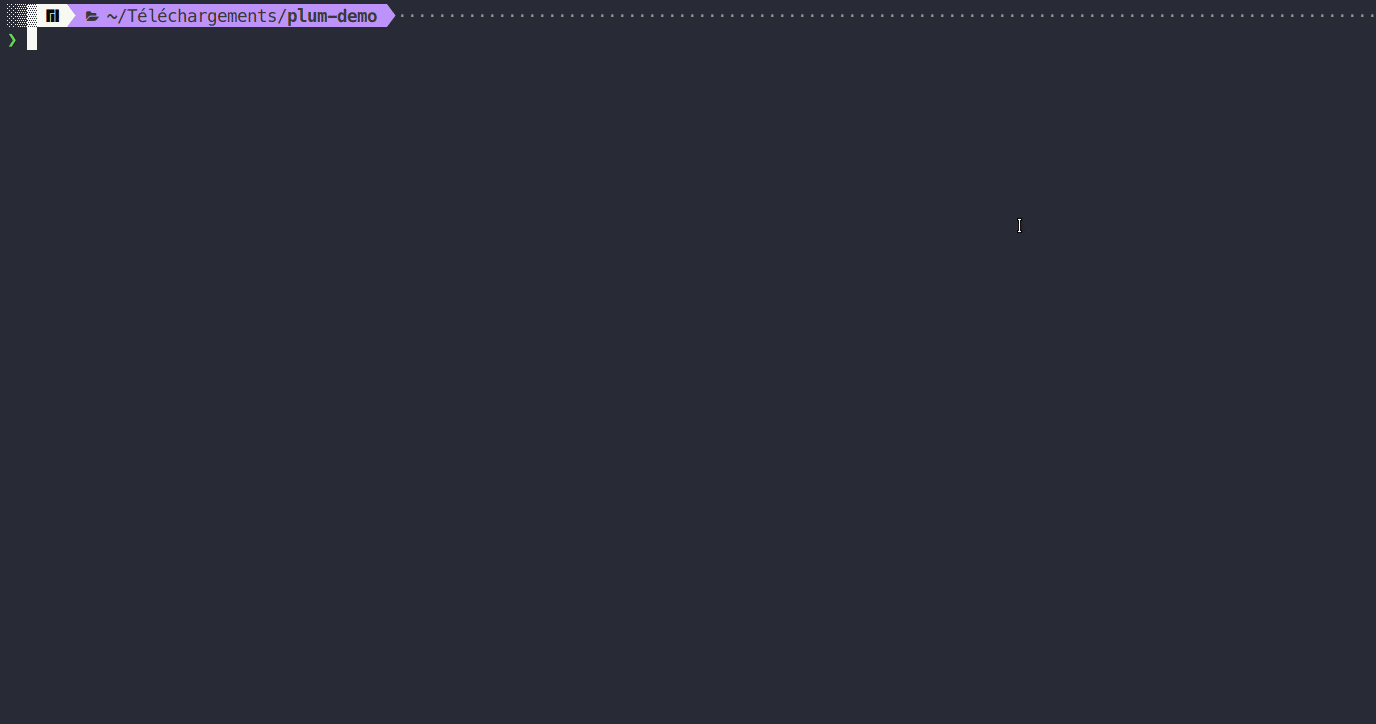Streamline your web development process with Plum CLI. Effortlessly integrate the Plum package, access offline documentation and unlock a suite of applications for better use of third-party modules.
npm install -g @raja-rakoto/plum-cliStart
- 📜
start- Run your application with bun. - 📜
start:smol- Run your application with bun and a flag which configures the JavaScriptCore heap size to be smaller and grow slower. - 📜
start:bin- Run your standalone binary app.
Clean
- 📜
clean- Remove coverage data, prod, build.
Development
- 📜
dev- Launch your application in development mode with bun. - 📜
dev:watch- Interactive watch mode to automatically transpile source files with bun in development. - 📜
dev:hot- Hot reloading of source files with bun in development. - 📜
dev:smol:watch- Interactive watch mode to automatically transpile source files with bun in development, while using --smol flag. - 📜
dev:smol:hot- Hot reloading source files with bun in development, while using --smol flag.
Build
- 📜
build- Transpile and bundle source files with bun. - 📜
build:watch- Interactive watch mode to automatically transpile source files with bun. - 📜
build:bin- bun's bundler implements a --compile flag for generating a standalone binary from a TypeScript or JavaScript file, use this in your production environment to ensure optimal execution of your app.
Testing
- 📜
test- Run bun test. - 📜
test:watch- Interactive watch mode to automatically re-run tests with bun.
Linting and Formatting
- 📜
biome:start- Starts the Biome daemon server. You can specify a custom configuration file path using the--config-pathoption. - 📜
biome:stop- Stops the Biome daemon server. - 📜
biome:fix- Runs a source code check and applies automatic fixes (linter & formatter) according to the defined rules. - 📜
biome:unsafe- Works likebiome:fix, but may apply more invasive or risky changes.
Backup and Dependency Management
- 📜
backup- Backup files with Grunt. - 📜
pkg-check- Check useless dependencies with depcheck. - 📜
pkg-upgrade- Upgrade outdated dependencies (interactive mode) with npm-check-updates.
Versioning
- 📜
versioning- Start ungit server.
NPM Commands
- 📜
npm-version:major- Increments the major version number of your project using npm. - 📜
npm-version:minor- Increments the minor version number of your project using npm. - 📜
npm-version:patch- Increments the version patch number of your project using npm. - 📜
npm-login- Login to a registry user account. - 📜
npm-publish- Publish your npm package with public access. - 📜
npm-unpublish- Forcefully unpublish the cli package from npm. - 📜
npm-reset:registry- Delete the custom npm registry. - 📜
npm-check:registry- Get the currently configured registry for npm. - 📜
npm-proxy-set:registry- Set the npm registry to use a local proxy. - 📜
npm-proxy:start- Start a Verdaccio server with a local npm proxy. - 📜
npm-proxy:publish- Publish your npm package via the local proxy. - 📜
npm-proxy:unpublish- Forcefully unpublish the cli package from the npm registry via the local proxy. - 📜
npm-proxy:republish- Republish your npm package by first unpublishing it and then publishing it again via the local proxy.
NVM
- 📜
nvm- Manage multiple node.js versions. Easily switch between node versions per project to ensure compatibility.
When using the build.js file in this boilerplate, it's important to note the significance of the target option. By default, if the target option is not specified in the build.js file, it will be set to browser. However, for projects utilizing the bun.js runtime environment, it's imperative to explicitly set the target to bun. This guarantees compatibility with the bun shell environment and prevents unexpected behavior. Furthermore, it's noteworthy that the target supports three possible values: browser, bun, and node, providing flexibility in defining the build target according to specific project requirements.







